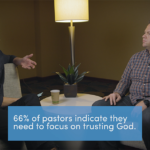
Someone has said, “Ignorance is bliss.” That may be true for the ignorant, but not everyone else. Well-meaning as we may be, our immaturity and inexperience have consequences.
By Daryl Crouch
“I didn’t know what I didn’t know.”
That could be the theme of my first 10 years in ministry. Someone has said, “Ignorance is bliss.” That may be true for the ignorant, but it’s not bliss for everyone else.
Well-meaning as we may be, our immaturity and inexperience have consequences.
When Rehoboam assumed power in Israel, notice how the advice he received from the more experienced leaders contrasted with the advice he received from his youthful peers:
The experienced leaders told Rehoboam,
“Today if you will be a servant to this people and serve them, and if you respond to them by speaking kind words to them, they will be your servants forever” (1 Kings 12:7).
The young leaders advised him to warn the people,
“My little finger is thicker than my father’s waist! Although my father burdened you with a heavy yoke, I will add to your yoke; my father disciplined you with whips, but I will discipline you with barbed whips” (1 Kings 12:10-11).
The experienced leaders said, “Serve well and speak kindly.”
The inexperienced leaders said, “Crack the whip!”
Rehoboam flew past the advice of those who were ahead of him and instead relied on the counsel of his peers. His youthful ambition blinded him to godly wisdom, and the people around him suffered for it. I can relate to that.
Although I had zeal, energy, and vision in my early years of ministry, I lacked what many young pastors lack: wisdom.
I sought out the advice of others. I read books. I attended conferences. And I received two seminary degrees. All of that was helpful, but nothing has taught me more about pastoring than the practice of pastoring.
Nothing has helped me grow as a pastor more than the practice of pastoring. Nothing has helped me enjoy pastoring more than the daily practice of pastoring. And nothing has changed my perspective on pastoring a local church more than actually pastoring a local church.
So here are four shifts in thinking about ministry I had over years of church leadership.
1. Following a leader is harder than you think. Be kind.
The apostle Paul wrote about his daily concern for the church. The burden of leading and caring for a congregation is real, and pastors should be honored for their service. But church members carry a burden as well. The writer of Hebrews exhorts,
“Remember your leaders who have spoken God’s word to you. As you carefully observe the outcome of their lives, imitate their faith” (Hebrews 13:7).
“Obey your leaders and submit to them, since they keep watch over your souls as those who will give an account, so that they can do this with joy and not with grief, for that would be unprofitable for you” (Hebrews 13:17).
The Bible never expects believers to follow pastors into sin or heresy, but when the Holy Spirit inspired Hebrews 11, He knew that every pastor falls short of the glory of God.
Pastors do not walk in perfect wisdom. Pastors do not always make great decisions. Pastors do not always exegete the Scriptures exactly right.
Yet the biblical responsibility of every church member is to support, pray for, and follow those who watch over their souls. This is a difficult, yet sanctifying work of God in the life of every believer that calls pastors to a posture of humility, kindness, and grace.
2. Good theology isn’t enough. Learn people skills.
Pastors study to show ourselves approved handling accurately the word of truth (2 Timothy 2:15), but good theology is not enough. The apostle Paul said if we speak with the tongues of angels, yet fail to love, we’re noisy gongs (1 Corinthians 13). Jesus served with both grace and truth.
It’s not bad theology that derails a church or sidelines a pastor. Instead, it seems that one of the greatest contributing factors to church conflict is the poor people skills of the pastor.
So show up on time and be prepared. Give a firm handshake. Look people in the eye. Return emails and telephone calls in a timely manner. Ask good questions. Say please and thank you. Take “no” for an answer. Help stack chairs and put tables away. Be available. And learn to laugh more.
Learning to exegete people can be just as important as learning to exegete the Scripture. Wise pastors pay attention to what motivates people as well as what grieves people, and then we serve them according to their bent.
3. Talent alone isn’t sufficient. Build trust.
Talent gets attention, but trust fuels Christian disciple making. We will watch talented people. Talented people will entertain us, and we will cheer for them and shower them with accolades. But we don’t necessarily follow talented people or encourage the people we love the most to do so.
There are many music artists and sports superstars that we love watching, but would never follow. Yet many pastors are tempted to rely on talent, personal charisma, theological acumen, or even positional authority, and neglect the long work of building trust with the congregation.
As one mentor told me, “They won’t trust you until they know they can trust you.” And church members learn to trust their pastor as they watch us live out our faith consistently over time. They observe our lives and then gradually trust us with theirs.
So wise pastors take the time and make the effort to get to know, learn to like, and grow to love their church family deeply.
We roll our sleeves up and serve together. We walk with our church members through marriage trouble, job losses, illnesses, and deaths.
We show up every Sunday prepared to preach the Word. We value people for who they are not simply for what they can do. We admit mistakes, walk in humility, and speak with honesty.
And as trust grows, God expands our capacity to lead people to make greater sacrifices and to joyfully give their lives for the sake of the gospel.
4. Everyone else comes and goes. Invest in people.
It’s well known, but not always well imitated: Jesus invested in twelve men and those men changed the world. Disciples make disciples through genuine relationships built around the gospel of Jesus Christ.
There was a time I thought there may be a shortcut. Maybe better music. Maybe newer facilities. Or maybe a better staff.
But I finally discovered that there’s no church growth program, no sermon series, no graphics package, no social media strategy, and no leadership seminar that can substitute for simply and significantly investing in people.
One harsh reality in church work is that people tend to come and go. But one liberating observation is that the people we personally invest in usually stick around for the long haul. Jesus lost Judas, so there’s always some attrition. Eleven out of twelve, however, is a trend I can celebrate.
So whatever else is on a church leader’s job description, move “personal disciple maker” to the top of the page.
Daryl Crouch
Daryl is the executive director of Everyone’s Wilson, a coalition of gospel-loving churches who work together for the good of everyone in Wilson County, Tennessee.











